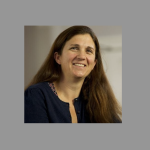Volunteer profile – Chris Young, Head of Structural Economics Division, Monetary Analysis, Bank of England
Chris Young is Head of Structural Economics Division, Monetary Analysis at the Bank of England. Chris tells us why socio-economic diversity and mobility is an issue close to his heart, and why he thinks that mentoring is such a beneficial thing to do, for both the mentee and the volunteer.
Why do you volunteer?
Socio-economic diversity and mobility is an issue close to my heart.
I went to a large state secondary school, around 1600 where more pupils stayed on in the Sixth Form to re-sit their GCSEs in the hope of better grades than study for A-levels (and the vast majority left at 16 to start work).
I’ve previously worked on Bank-sponsored schemes designed to promote literacy for pupils where English is typically a second language, as a ‘Reading Partner’ at a primary school near Whitechapel and have been a ‘Letter Writing Partner’ at a similar school. (I’ve also participated in mentoring and sponsorship schemes, internally at the Bank of England.)
But I hadn’t worked with senior school pupils – or where the scope is wider, extending to big life choices about university and jobs.
And so I was interested last year when the Bank’s Community department advertised opportunities to mentor a Year 12 student as part of a scheme run by the East London Business Alliance.
What have you gained from your volunteering experience?
After a few training sessions, I was ‘matched’ with my mentee and from March to Dec we met every two weeks for an hour at the Bank, so you don’t need to travel though there is a really nice ‘end of mentoring’ celebration event at that ELBA organised at the school in Hackney at the end of the scheme. The timeline is aimed to provide support outside the school and family over this crunch period of Year 12 and 13.
My mentee is studying Economics, Maths and Chemistry at A-level and is thinking of studying Economics at university. An important finding in a recent Royal Economics Society Report on ‘Who studies economics’ was that A-level Economics students from a lower socio-economic background are less likely to study the subject at university and, if they do, to drop out; see Who Studies Economics? An Analysis of Diversity in the UK Economics Pipeline , Royal Economics Society (March 2023).
After some ‘getting to know you’ exercises, our discussions focussed on SkillBuilder and particularly economics. That included aspects of the A-level course they had found interesting, live topical issues and what a career working as an economist could involve.
We also talked about study methods, as the exams which will inform predicted A-level grades loom large on the horizon.
But mainly we focussed on university applications and discussing questions like: Should I go to university? How will I pay for it? Related to that, should I live at home or in/near the university? What does that choice mean for my university applications? What do I want from an economics course? What will I get from it? How can I maximise my chances of getting in? Why are the required grades so different across universities? Should I do an apprenticeship? Or a gap year? Then helping them narrow down the long-list of possible courses and universities – and then helping sketch out what their UCAS personal statement might cover.
Would you recommend volunteering to a colleague and, if so, why?
For me, the discussions with my mentee have been a reminder of how many really big decisions 16/17 year olds have to make in a very compressed space of time.
But, more than anything, the scheme has brought home to me how even some knowledge about the school-university transition – even including relatively accessible information about university Open Days, university websites with tips on writing personal statements etc – can make this process seem a little less daunting.
If you studied at university, you might well take for granted that knowledge about how to navigate the landscape – and so underestimate the contribution you might be able to make. I know I did. But it can be really helpful, potentially opening up opportunities and pathways, both in economics and also more broadly, to those from a wide set of backgrounds.
So please do think about mentoring, you’ll be able to offer a lot and will get a lot out of it.



